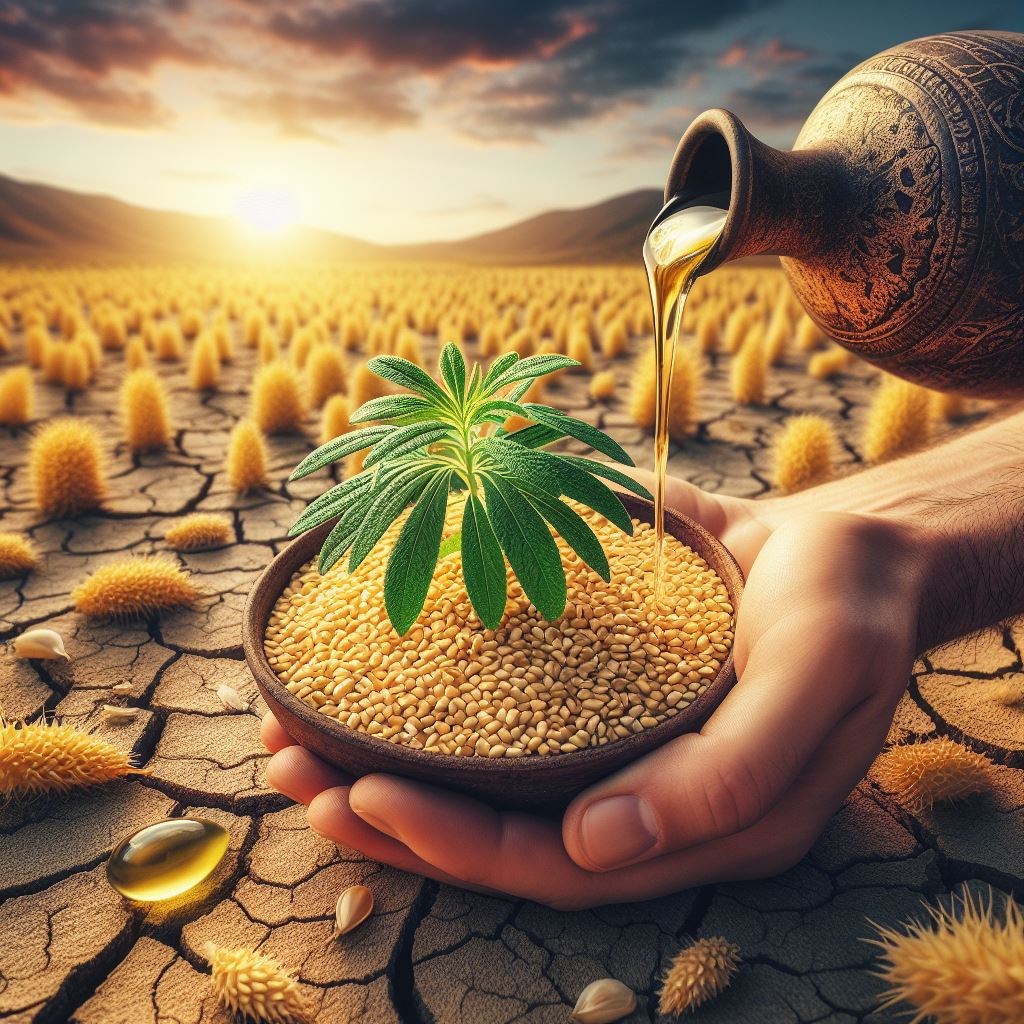Sesame (Sesamum indicum L.) is an important oil seed crop, but its quality, and production are often reduced by drought stress.
Sesame (Sesamum indicum L.) is an important oil seed crop, but its quality, and production are often reduced by drought stress.
Challenges Faced by Sesame Cultivation in Pakistan
Sesame (Sesamum indicum) cultivation faces several challenges affecting its production and sustainability. These challenges are important for farmers, and stakeholders to understand because they can address issues that can reduce the production of sesame.
Water Scarcity:
One of the leading challenges is a shortage of water, as sesame demands a specific amount of water to complete its growth and development. Regions with a limited supply of water pose a real restriction to sesame cultivation.
Environmental issues
Sesame is at risk of environmental stress.
Drought, waterlogging, heat, and salinity are major threats to sesame growth, impacting yield significantly. Drought limits water, stunting growth; waterlogging suffocates roots. High temperatures stress plants, reducing seed formation. Salinity disrupts water uptake, diminishing yield. Managing these challenges is essential for successful sesame cultivation.
- Capsule Shattering:
Seed is the main output of the crop, and its loss due to capsule shattering is a common issue in sesame. We need to harvest sesame before shattering starts, and it’s time to develop high-yielding and climate-adapted varieties to increase productivity.
- Climate-related crop damage
Climate change is an emerging issue for all crops in this era. Unusual changes in weather, such as excessive rainfall, winds, or floods, can damage the crop. It is reported that rainfall in Pakistan has affected sesame, leading to a rise in sesame seed prices.
Addressing these challenges needs a comprehensive approach, including working to develop drought-stress varieties and having strong pods. need to manage water efficiently and take measures to reduce environmental stress. By handling these issues, the sesame industry in Pakistan can contribute to sustainable agriculture.
Sesame (Sesamum indicum) is important for both human health and economic sustainability. It’s a staple crop in various cultures, offering a lot of benefits.
Health Benefits of Sesame:
Nutritional Value:
Sesame seeds are a rich source of oil, and essential nutrients, proteins, healthy fats, vitamins, and minerals are part of them. We can say it is a complete source of nutrition for human health.
Cardiovascular health:
It has compounds that may protect against heart-related diseases. Healthy fats and antioxidants in sesame contribute to cardiovascular health.
Medicinal Uses:
The oil, derived from the sesame seeds, has been used in traditional medicine for its various health benefits. It has compounds with potential medicinal qualities, including anti-inflammatory and antioxidant effects.
Antioxidant Properties:
Sesame seeds hold antioxidant properties, help to control oxidative stress, and reduce the risk of chronic diseases.
Fiber Content:
Sesame seeds have fiber content that helps to maintain the digestive system and contributes to a healthy gut to regulate bowel movements and digestive health.
Economic Importance:
Oil seed crop:
Sesame is an important oilseed crop; seeds are processed to ensure oil production. Sesame oil is widely used in kitchens and is a significant component in many cuisines globally.
Cash Crop:
Sesame is a cash crop for farmers in 2023, and farmers earn a lot of profit from it. Demand for sesame seeds is increasing in many industries, including food and cosmetics.
Global Trade:
Sesame is a player in the global trade market, with many countries contributing to its production and marketing in the global market. The economic importance of sesame positively contributes to the overall agricultural economy.
